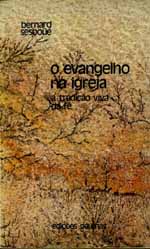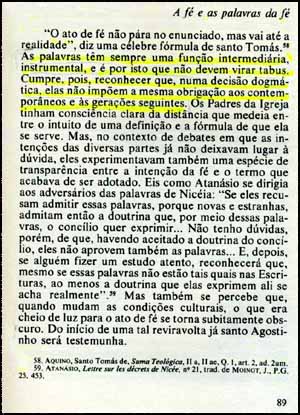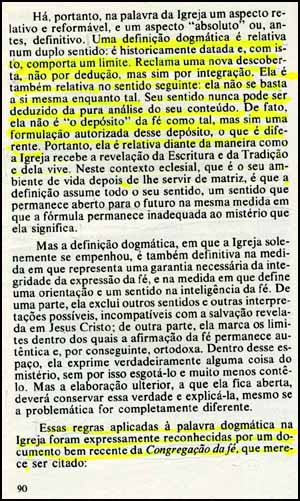Fr. Bernard Sesboue, SJ, is a professor at the Center Sevres of Paris, consultant for the Secretariat for the Union of the Christians, and ex-member of the International Theological Commission. In his book The Gospel in the Church he defends that dogmatic formulations must change according to the different times. Doing this, he makes the Catholic Creed completely relative.
This same thesis was expressely condemned as a Modernist proposition in the Encyclical Pascendi (§ 28, see also §§ 13, 21, 38. At the end of the Encyclical is the Syllabus by St. Pius X, in which this thesis is condemned in nn. 24, 26, 54, 58)
At right, the cover of The Gospel in the Church. Below, we present our translation of the highlighted Portuguese text.
Words always have an intermediary and instrumental function, and that is why they must not become taboos. Therefore, it should be recognized that in a dogmatic decision, the words do not impose the same obligation on the people of the time and the following generations. ...
A dogmatic definition is relative in two senses: [first] it is historically dated and thus has limits, and [second] it claims a new discovery not by deduction, but by integration. It is also relative in that as such it does not suffice unto itself. Its meaning can never be deducted from a pure analysis of its contents. Indeed, it is not the 'deposit' of faith as such, but an authorized formulation of this deposit, which is different. ...
The Church's application of these rules to the word dogmatic was expressely acknowledged in a very recent document by the Congregation [for the Doctrine] of the Faith. [Declaration Mysterium Ecclesiae, June 24, 1973, n.5, La Documentation Catholique, n. 1636, 1973, p. 667].
(Bernard Sesboüé, O Evangelho na Igreja - A Tradição Viva da Fé, São Paulo: Paulinas, 1977 pp. 89-90)
|


 |
|
